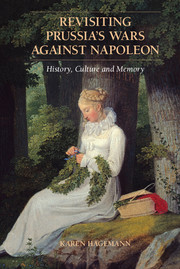Book contents
- Frontmatter
- Epigraph
- Contents
- List of Figures and Maps
- List of Abbreviations
- Acknowledgments
- Revisiting Prussia’s Wars against Napoleon
- Part One A History of Defeat, Crisis and Victory
- Part Two Discourses on the Nation, War and Gender
- Part Three Collective Practices of De/Mobilization and Commemoration
- Part Four Literary Market, History and War Memories
- Part Five Novels, Memory and Politics
- Epilogue Historicizing War and Memory, 2013–1813–1913
- Bibliography
- Name Index
- Subject Index
- Plate section
Part Five - Novels, Memory and Politics
Published online by Cambridge University Press: 05 March 2015
- Frontmatter
- Epigraph
- Contents
- List of Figures and Maps
- List of Abbreviations
- Acknowledgments
- Revisiting Prussia’s Wars against Napoleon
- Part One A History of Defeat, Crisis and Victory
- Part Two Discourses on the Nation, War and Gender
- Part Three Collective Practices of De/Mobilization and Commemoration
- Part Four Literary Market, History and War Memories
- Part Five Novels, Memory and Politics
- Epilogue Historicizing War and Memory, 2013–1813–1913
- Bibliography
- Name Index
- Subject Index
- Plate section
Summary
Novels, Memory and Politics
In the decades following the Napoleonic Wars, history books, autobiographical accounts and novels evolved into three at once complementary and competing media in the production of memory about these wars, which would shape collective memory for a long time to come. They all reflected the “emergence of history” – the formation of a new postrevolutionary and postwar historical consciousness that began to develop in the first half of the nineteenth century. The conditions in which they arose were influenced by a mixture of differing and shared factors. Changing political circumstances affected all the media of memory. The creation of all three types of texts was also subject to the structural transformation of the literary market. However, this applied less to history books, which tended to serve a relatively small and specialized market segment, than to autobiographies and war memoirs and especially to novels intended for a wide audience. While historians were increasingly expected to meet the expectations of a professionalizing discipline, which narrowed the accepted forms of historical writing, and memoirists who hoped for success could only operate within a framework constructed as “true” by historians and eyewitnesses, novelists had greater latitude. Their interpretation of the period of the wars from 1806 to 1815 simply had to strike the reader as credible and plausible. In order to create this impression, novelists had to acknowledge the historical master narratives and the basic, accepted historical facts, but in general they could interpret the era more freely, a possibility that increased with the temporal distance to the remembered events. Even more than history books and autobiographical recollections, novels could therefore be used to comment on present-day society, culture and politics. In writing about the past, novelists remarked upon and criticized or affirmed the society and politics of their own day. These authors were driven by their political ideals, but many others primarily tried to serve the market by choosing topics that would sell. Most novelists wrote to earn a living. Those who were freelance writers depended far more than most authors of history books and autobiographies on the market, because for many of the latter writing was not their main source of income.
- Type
- Chapter
- Information
- Revisiting Prussia's Wars against NapoleonHistory, Culture, and Memory, pp. 337 - 340Publisher: Cambridge University PressPrint publication year: 2015



